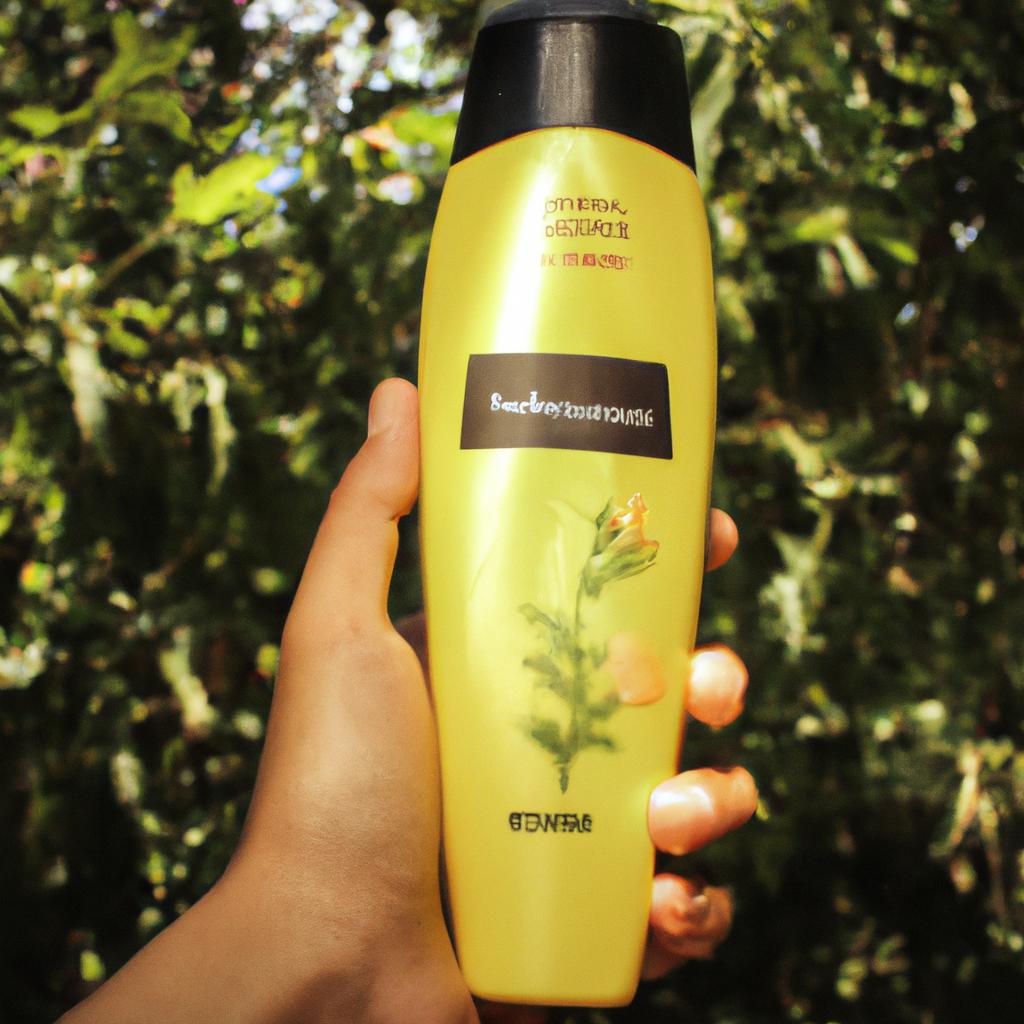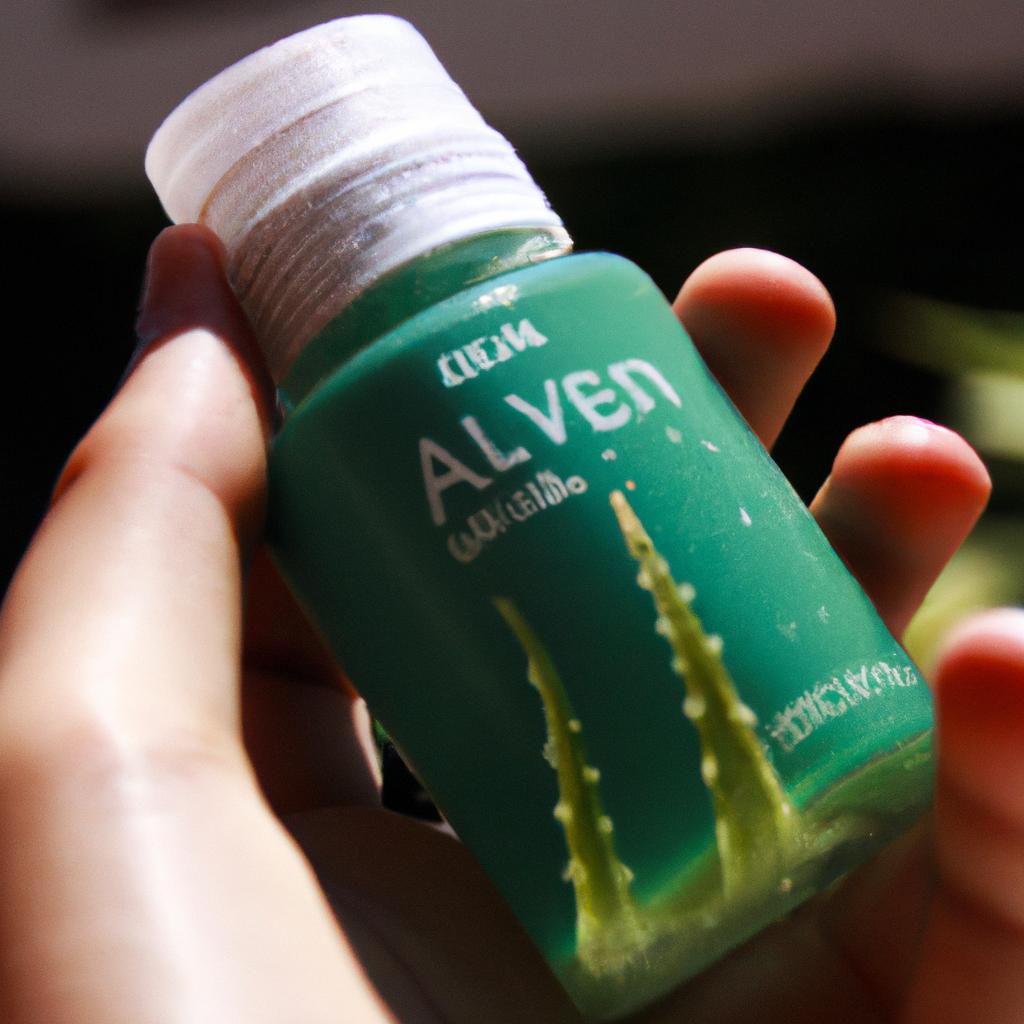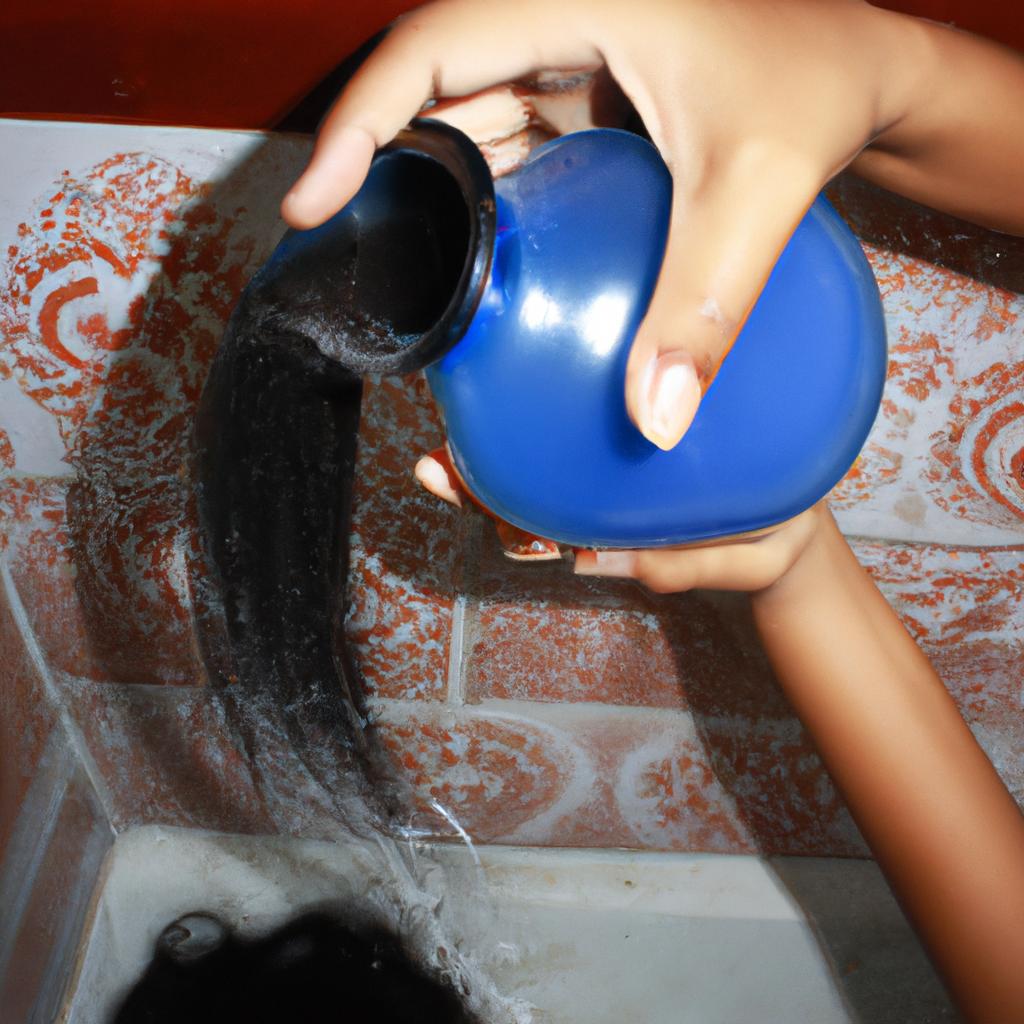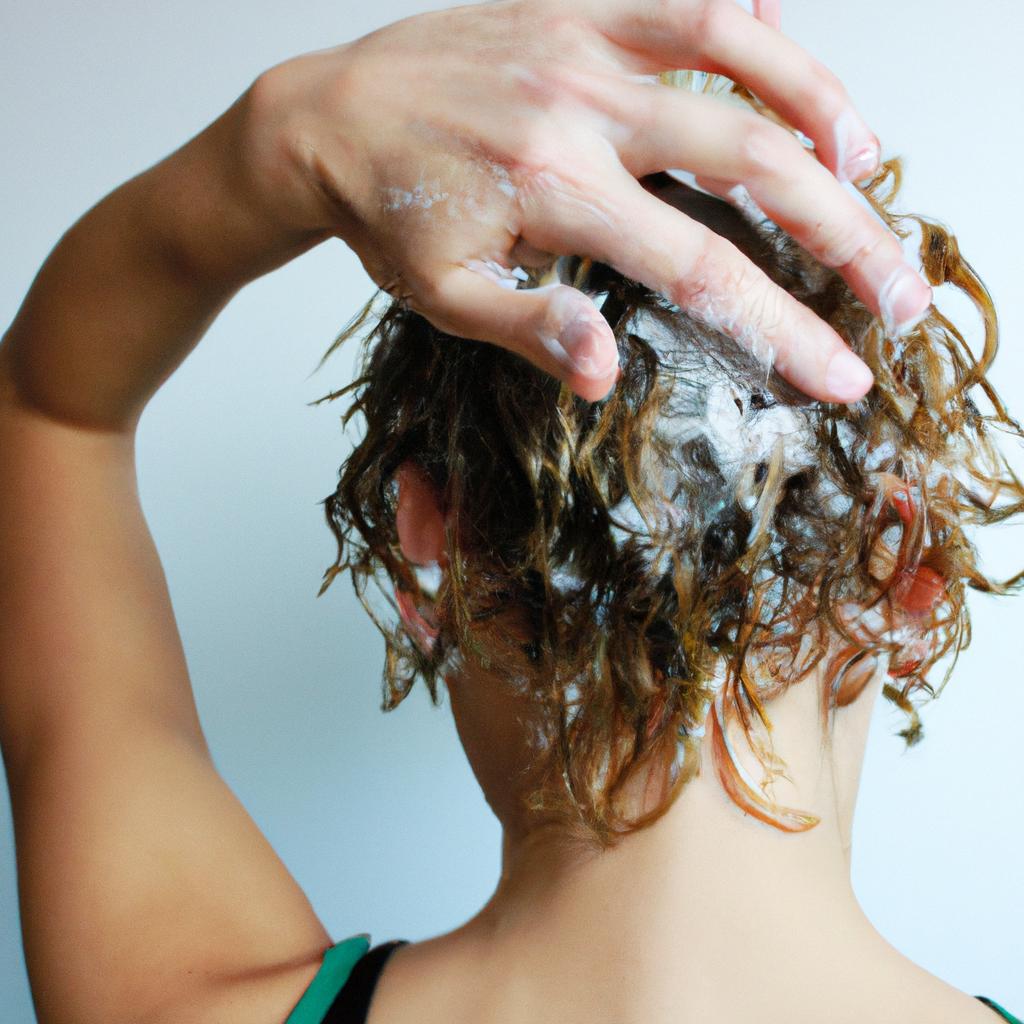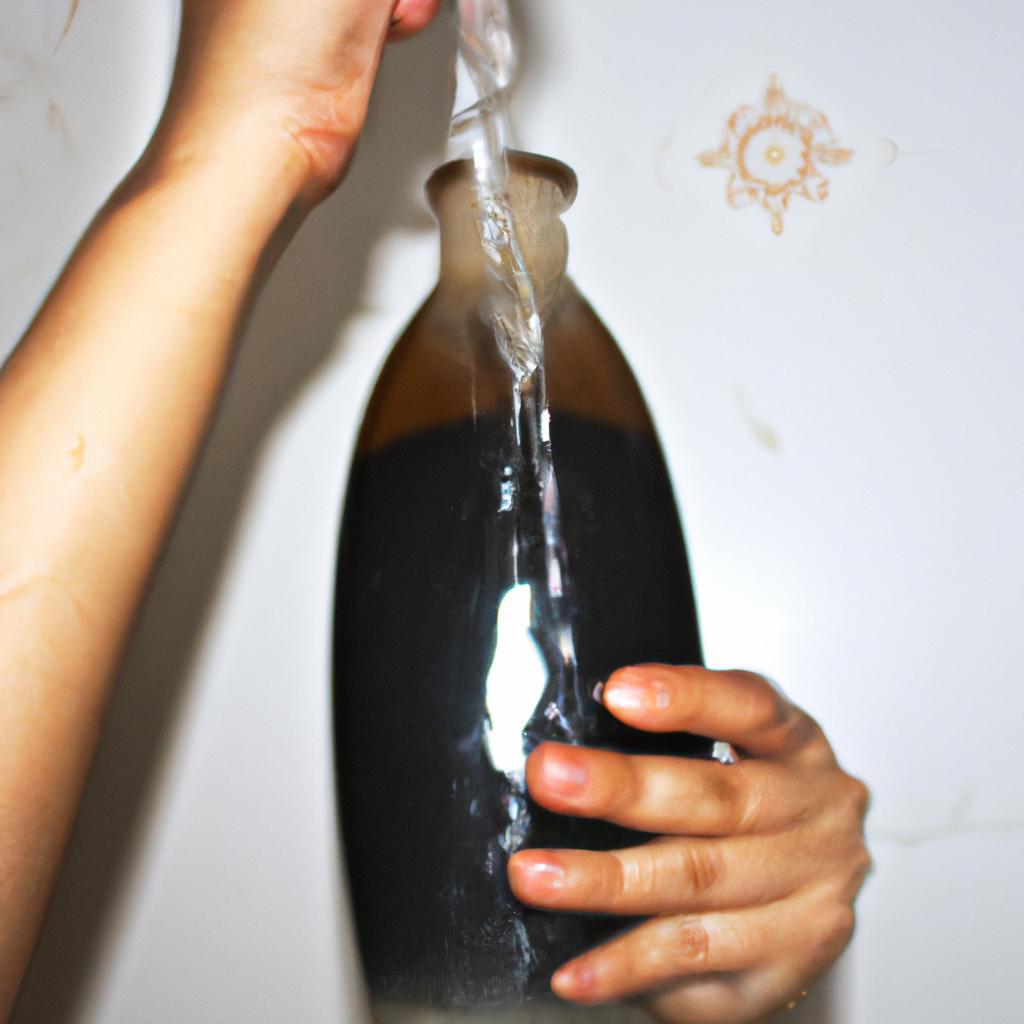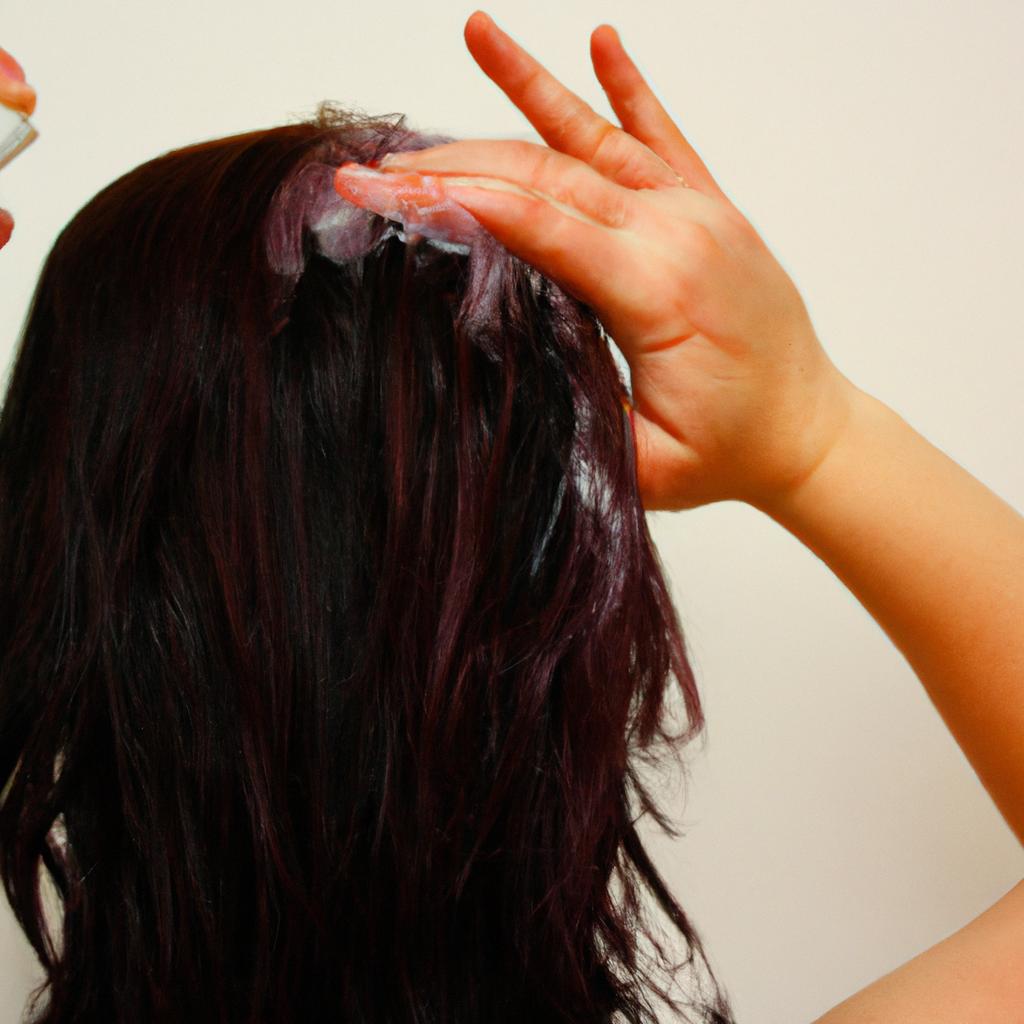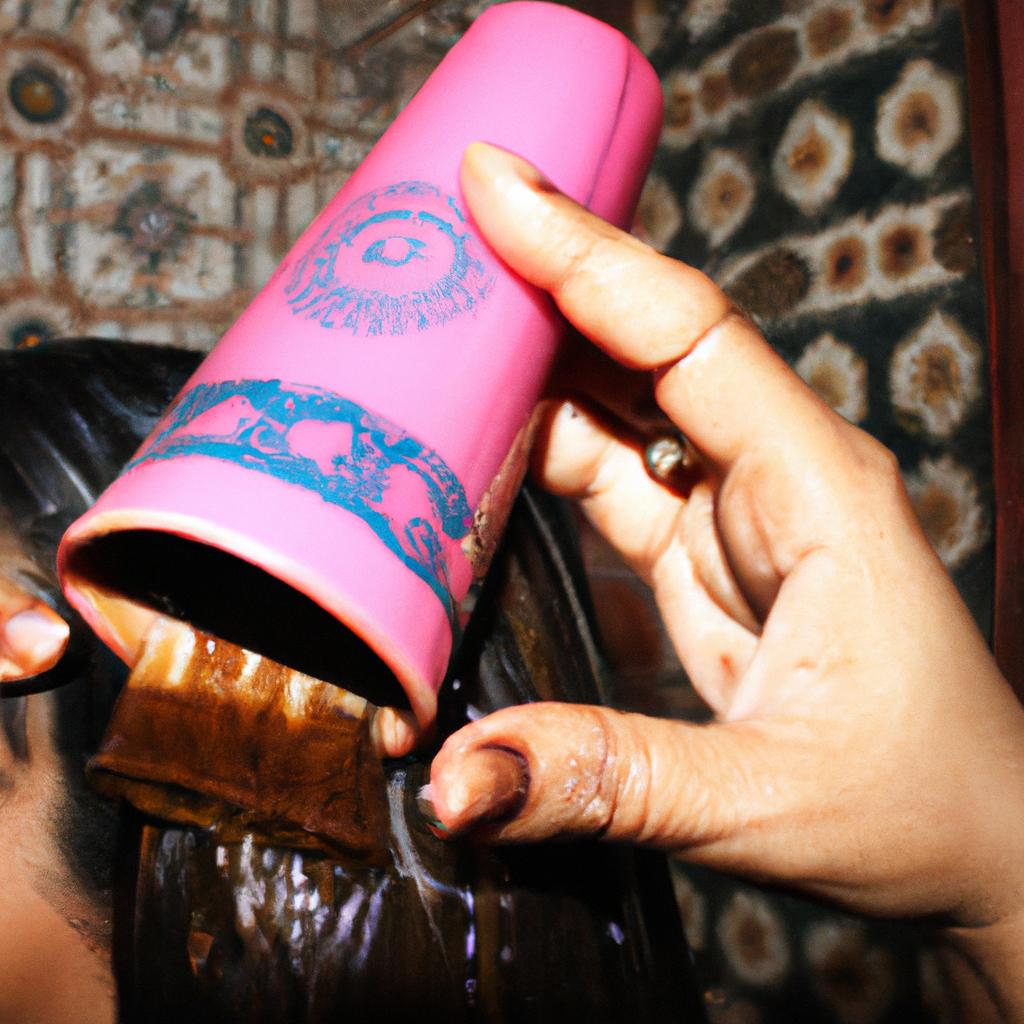In a world where hair care products are abundant, consumers often find themselves overwhelmed by the variety of options available. However, amidst this vast array of choices, traditional Indian shampoos stand out for their unique use of essential oils. These aromatic extracts from plants have been utilized in India for centuries due to their numerous benefits for both hair and scalp health. For instance, imagine a hypothetical scenario where an individual with dry and damaged hair is searching for a solution that not only cleanses but also nourishes and revitalizes their locks. In such a case, turning to Indian traditional shampoos enriched with essential oils can prove to be highly beneficial.
The diversity within Indian traditional shampoo formulations lies in the wide range of essential oils used. Each oil possesses distinct properties that contribute to different aspects of hair care. Essential oils extracted from herbs like Amla, Neem, and Brahmi provide strength and shine to dull or brittle hair strands. On the other hand, oils derived from flowers such as Rose, Hibiscus, and Jasmine offer deep moisturization while leaving behind a delightful fragrance. Additionally, some essential oils like Lavender and Peppermint possess calming effects on the scalp, promoting relaxation and reducing stress-related issues like dandruff and itchiness.
The history of traditional Indian shampoo
Imagine a young woman named Aisha living in a remote village in India. She has thick, lustrous hair that she takes great pride in. However, due to the harsh environmental conditions and lack of modern amenities, her hair often becomes dull and lifeless. Seeking a solution, Aisha turns to traditional Indian shampoo, which has been used for centuries to maintain healthy hair.
Traditional Indian shampoo can be traced back centuries ago when Ayurveda, an ancient system of medicine originating from the Indian subcontinent, emphasized the importance of natural ingredients for overall well-being. Shampooing was considered not only as a means to cleanse the scalp but also as a ritualistic practice promoting harmony between mind, body, and spirit. The use of herbal infusions with specific medicinal properties became integral to this practice.
To understand the significance of traditional Indian shampoo better, let us explore some key aspects that make it unique:
- Herbal Ingredients: Traditional Indian shampoos primarily consist of botanical extracts such as hibiscus, neem, fenugreek seeds, and shikakai. These herbs are known for their nourishing, cleansing, and conditioning properties.
- Aromatherapy: Essential oils derived from plants like lavender or rosemary are often added to enhance fragrance and provide therapeutic benefits during hair washing.
- Gentle Cleansing: Unlike commercial shampoos containing sulfates and other harsh chemicals that strip away natural oils from the scalp and hair strands, traditional Indian formulas prioritize gentle cleansing without compromising on effectiveness.
- Holistic Approach: In addition to maintaining hair health externally through cleansing rituals using herbal formulations, traditional Indian practices emphasize internal wellness by incorporating balanced diets rich in nutrients beneficial for hair growth.
This historical context showcases how traditional Indian shampoo serves not just as a cosmetic product but rather as an embodiment of cultural heritage rooted deeply within communities across India. Understanding its origins and unique characteristics lays the foundation for exploring the key ingredients used in traditional Indian shampoo, which will be discussed in the subsequent section.
Key ingredients used in traditional Indian shampoo
Transitioning from the previous section, let us now explore the key ingredients that are commonly found in traditional Indian shampoos. To illustrate this further, consider the hypothetical example of a popular Ayurvedic shampoo brand called “HerbEssence.”
One of the reasons why HerbEssence is highly sought after is its use of essential oils extracted from various botanical sources. These aromatic and concentrated plant extracts not only impart a pleasant fragrance but also offer several benefits for hair care. Let’s delve into the intriguing world of essential oils and their role in traditional Indian shampoo.
To start with, here are some important points to understand about essential oils:
- Essential oils are derived from plants through processes like distillation or cold pressing.
- They possess unique properties that can promote scalp health, improve hair texture, and address specific concerns such as dandruff or hair loss.
- Each essential oil has distinct characteristics and therapeutic effects when applied to the hair and scalp.
- When combined with other herbal ingredients, these oils form potent formulations that have been used for centuries in traditional Indian shampoo recipes.
For a clearer understanding, let’s take a look at the table below showcasing four common essential oils used in traditional Indian shampoos along with their main benefits:
| Essential Oil | Main Benefits |
|---|---|
| Lavender | Soothes scalp irritation |
| Rosemary | Stimulates hair growth |
| Cedarwood | Reduces dandruff |
| Peppermint | Enhances blood circulation |
As you can see, each oil brings its own set of advantages to the overall formulation. By incorporating these natural wonders into their products, brands like HerbEssence aim to provide users with a holistic hair care experience.
Understanding these advantages can further highlight the importance of incorporating these natural ingredients into our daily hair care routines.
Transitioning into the subsequent section about “Benefits of using essential oils in Indian traditional shampoo,” it becomes evident that exploring the advantages of essential oils is crucial to understanding their significance and potential impact on hair health.
Benefits of using essential oils in Indian traditional shampoo
Having explored the key ingredients commonly used in traditional Indian shampoo, it is now crucial to delve into the benefits that can be derived from incorporating essential oils into these formulations. To illustrate this point further, let us consider a hypothetical case study involving Priya, a young woman struggling with dry and damaged hair due to excessive heat styling.
Benefits of Using Essential Oils in Indian Traditional Shampoo:
-
Enhanced Hair Health:
- Essential oils such as lavender, rosemary, and tea tree oil have properties that promote hair growth by improving blood circulation to the scalp.
- They help strengthen hair follicles, preventing breakage and reducing hair loss.
- These oils also possess antimicrobial properties that combat dandruff and fungal infections on the scalp.
-
Nourishment and Moisture:
- Essential oils like coconut oil, almond oil, and argan oil are rich in vitamins and fatty acids that deeply nourish the hair shafts.
- These oils provide intense hydration to dry strands, restoring their natural luster and vitality.
- By locking in moisture, they protect the hair from environmental damage caused by pollutants or harsh weather conditions.
-
Scalp Care:
- Certain essential oils, including peppermint oil and eucalyptus oil, possess soothing properties that alleviate itchiness and irritation on the scalp.
- They help balance sebum production without stripping away natural oils excessively.
- Regular use of these oils promotes a healthy scalp environment for optimal hair growth.
Emotional Bullet Point List (markdown format):
- Discover vibrant and healthier-looking tresses through ancient wisdom
- Experience the aromatic indulgence of nature’s finest essences
- Rejuvenate your hair with the power of natural ingredients
- Embrace the time-tested secrets for nourishing and restoring your crowning glory
Emotional Table (markdown format):
| Benefit | Essential Oils |
|---|---|
| Enhanced Hair Health | Lavender, Rosemary, Tea Tree |
| Nourishment & Moisture | Coconut Oil, Almond Oil, Argan Oil |
| Scalp Care | Peppermint Oil, Eucalyptus Oil |
Incorporating these oils into traditional Indian shampoo recipes can transform ordinary hair care routines into exceptional experiences. Reap the rewards of utilizing essential oils by adopting these revered practices in your own hair care regimen.
As we continue our exploration of Indian traditional shampoo, let us now delve into various authentic recipes and do-it-yourself methods that have been passed down through generations.
Traditional Indian shampoo recipes and DIY methods
In the previous section, we explored the numerous benefits of incorporating essential oils into Indian traditional shampoo. Now, let us delve deeper into some specific recipes and do-it-yourself (DIY) methods that highlight the versatility and effectiveness of these natural ingredients.
Imagine a scenario where an individual is struggling with excessive hair fall due to dry scalp and brittle strands. They decide to try a homemade remedy by infusing their regular shampoo with rosemary essential oil. After consistent use for several weeks, they notice a remarkable reduction in hair fall, along with improved scalp health and stronger hair follicles. This case study exemplifies how essential oils can address common hair concerns when incorporated intelligently into traditional Indian shampoos.
To further understand the potential of essential oils in enhancing the efficacy of Indian traditional shampoos, consider the following key points:
- Essential oils possess antimicrobial properties that help combat fungal or bacterial infections on the scalp.
- Certain essential oils such as lavender or chamomile have relaxing effects which can alleviate stress-related issues like dandruff or itchy scalp.
- The aroma emitted by various essential oils adds a sensory dimension to the overall experience of washing one’s hair, creating a soothing effect during self-care routines.
- Essential oils act as potent conditioning agents that promote softness and shine while reducing frizz and breakage.
| Essential Oil | Key Benefit | Suggested Usage |
|---|---|---|
| Rosemary | Stimulates growth | Mix 5 drops with carrier oil |
| Tea Tree | Anti-dandruff | Add a few drops directly to shampoo |
| Jasmine | Moisturizes | Combine 2 drops with coconut milk |
| Ylang-Ylang | Enhances fragrance | Blend 3 drops into conditioner |
As demonstrated above, introducing different essential oils into your Indian traditional shampoo can cater to specific hair needs and preferences. By customizing your shampoo with these natural ingredients, you can achieve a personalized hair care routine that nurtures both your scalp and strands.
In the subsequent section, we will explore the role of Ayurveda in Indian traditional shampoos, shedding light on the ancient wisdom behind holistic hair care practices. The integration of Ayurvedic principles further enhances the effectiveness of essential oils in promoting overall hair health and vitality.
The role of Ayurveda in Indian traditional shampoo
Traditional Indian shampoo recipes and DIY methods have gained popularity due to their natural ingredients and potential benefits for hair health. One such example is the use of essential oils in these traditional shampoos. These oils are derived from various plant sources and offer a wide variety of properties that contribute to the effectiveness of Indian traditional shampoos.
One case study involves the incorporation of neem oil, an essential oil extracted from the neem tree, into a homemade shampoo recipe. Neem oil is known for its antibacterial, antifungal, and anti-inflammatory properties. By adding a few drops of neem oil to a base shampoo mixture made with herbal powders like Shikakai or Aritha, individuals can create a nourishing blend that promotes scalp health and helps combat dandruff or other scalp conditions.
Essential oils play a crucial role in Indian traditional shampoos by offering several advantages. Here are some key points to consider:
- Aromatherapy benefits: Essential oils not only cleanse the hair but also provide aromatherapeutic effects that promote relaxation and overall well-being.
- Scalp stimulation: Certain essential oils, such as peppermint or rosemary oil, possess stimulating properties that enhance blood circulation to the scalp, promoting healthy hair growth.
- Anti-dandruff properties: Tea tree oil and neem oil both exhibit antifungal properties that help reduce dandruff and keep the scalp clean.
- Hair conditioning: Essential oils like lavender or ylang-ylang can act as natural conditioners, leaving your hair soft, smooth, and manageable.
To illustrate further how different essential oils contribute to Indian traditional shampoos, here’s a table showcasing their specific qualities:
| Essential Oil | Benefits |
|---|---|
| Lavender | Calming aroma; promotes hair moisture |
| Rosemary | Stimulates hair follicles; improves growth |
| Peppermint | Refreshing sensation; enhances blood flow |
| Tea Tree | Natural antifungal properties; fights dandruff |
In summary, essential oils play a pivotal role in Indian traditional shampoos by offering various benefits such as aromatherapy effects, scalp stimulation, anti-dandruff properties, and hair conditioning. These natural ingredients contribute to the overall effectiveness of these shampoos while also providing a pleasant sensory experience during use.
Moving forward, let’s explore some tips for choosing the right Indian traditional shampoo for your specific hair type and concerns.
Tips for choosing the right Indian traditional shampoo for your hair type
The Role of Essential Oils in Indian Traditional Shampoo
Transitioning from the discussion on the role of Ayurveda in Indian traditional shampoo, we now delve into the fascinating world of essential oils and their significant contribution to these hair care products. To illustrate this point, let us consider a hypothetical case study: A young woman with dry and damaged hair has been searching for a solution that provides nourishment and rejuvenation. She decides to explore Indian traditional shampoos infused with essential oils known for their moisturizing properties.
Essential oils play a vital role in Indian traditional shampoos by providing various benefits to different hair types. Their natural compounds possess unique characteristics that can address specific concerns effectively. Here are some key ways in which essential oils enhance the efficacy of these shampoos:
-
Nourishment: Essential oils like coconut oil, almond oil, or argan oil deeply penetrate the hair shafts, replenishing lost moisture and nutrients. This helps improve overall hair health, making it softer, shinier, and more manageable.
-
Scalp Care: Many essential oils have antimicrobial properties that help combat scalp infections such as dandruff or itchiness. Tea tree oil and neem oil are two examples known for their ability to soothe irritated scalps while promoting a healthier environment for hair growth.
-
Hair Growth Stimulation: Specific essential oils like rosemary oil or lavender oil contain stimulating properties that promote blood circulation to the scalp. This increased blood flow encourages hair follicles’ activity, leading to accelerated hair growth for those experiencing thinning or slow regrowth.
-
Stress Relief: Certain aromatherapeutic essential oils incorporated into Indian traditional shampoos provide emotional well-being alongside physical benefits. The calming scents of jasmine or ylang-ylang create a relaxing experience during shower time, reducing stress levels naturally.
To further emphasize the significance of using Indian traditional shampoo enriched with essential oils, consider the following table:
| Essential Oil | Hair Type | Benefits |
|---|---|---|
| Coconut oil | Dry and damaged | Deeply moisturizes, restores shine, and strengthens hair strands. |
| Tea tree oil | Oily and dandruff | Controls excess sebum production, reduces scalp itchiness, fights dandruff. |
| Rosemary oil | Thinning or weak | Stimulates hair growth, improves circulation to the scalp. |
| Jasmine oil | All hair types | Promotes relaxation, reduces stress levels during shower time. |
In summary, essential oils are a crucial component of Indian traditional shampoos as they offer various benefits depending on individual hair needs. From nourishment and scalp care to stimulating hair growth and providing emotional well-being, these oils contribute significantly to achieving healthy and lustrous locks.
By incorporating essential oils into their formulations thoughtfully, these shampoos effectively cater to diverse hair concerns while embracing the rich heritage of Indian traditional beauty practices.


